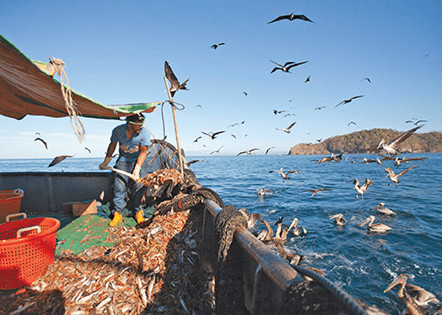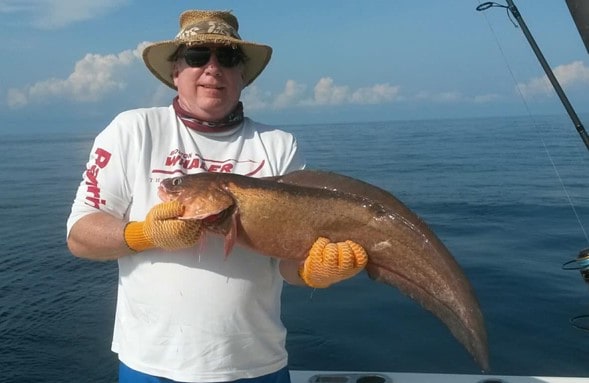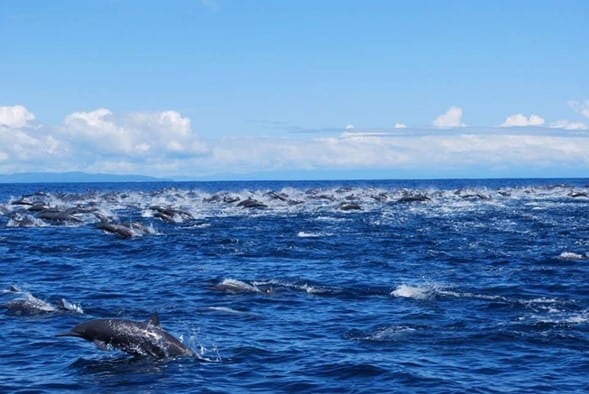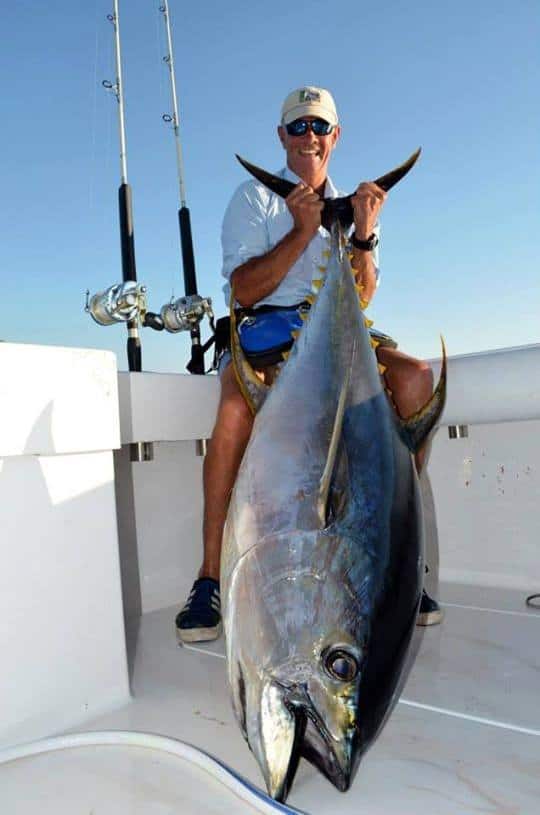There are a couple of proposed bills in congress that have been kicked around more than a soccer ball in the National Stadium. One is the tuna reform law which has been kicked around for the last couple of years, and the other is the shrimp trawling law that has been revived from death several times since 2013 and is coming up again for another vote.
Many agree on two things. Shrimp is one of the most delicious products that come from the sea and shrimp trawling is one of the most destructive types of fishing there is. Nearly 90% of sea-life caught in the nets is something other than shrimp, mostly juveniles of other bottom species. Apart from the bycatch the “sleds” that keep the nets on the bottom destroy habitat where the juvenile fish spend the early part of their lives.
The highest rates of incidental catch (bycatch) of non-target species are associated with tropical shrimp trawling. In 1997, the Food and Agriculture Organization of the United Nations (FAO) documented the estimated bycatch and discard levels from shrimp fisheries around the world. They found discard rates (bycatch to catch ratios) as high as 20:1 with a world average of 5.7:1.

Shrimp bycatch is shoveled mostly dead back into the sea. Marviva photo
Shrimp trawl fisheries catch two percent of the world total catch of all fish by weight, but produce more than one-third of the world total bycatch.
Tropical shrimp trawlers often make extended trips without coming to port. A typical haul may last four hours after which the net is pulled in. Just before it is pulled on board the net is washed by zigzagging at full speed. The contents are then dumped on deck and are sorted. An average of 5.7:1 means that for every kilogram of shrimp there are 5.7 kg of bycatch. In tropical inshore waters the bycatch usually consists of small fish.
The last of the licenses to shrimp trawl expired in 2019 and both artisanal fishermen and sport report a recovery of snapper, grouper, and congrio on near shore reefs. The shrimp issue has become a political punching bag and President Carlos Alvarado has vowed to veto the law if it is voted by congress to allow shrimping again.

Marviva recently sponsored a full page announcement in the National newspaper, La Nacion in which more than 100 different organizations signed on to protest the idea of bringing back shrimp trawling.
The tuna reform bill is another that is being tossed around now for nearly two years. It all started in 2013 when the Federacion Costarricense de Pesca (FECOP) sponsored a study that showed that Costa Rica only benefitted $37 for every ton of tuna taken by foreign purse sein boats as well as them earning free licenses to fish. The boats were allowed to fish within 12 miles of the coast and National fishermen complained they were impeding on their ability to make a decent living.
Then President Laura Chinchilla sponsored a decree to the purse seiners out 45 miles and protect a total of 200,000 square kilometers from purse sein netting. It was finally passed under President Luis Guillermo Solis in 2014, which moved the boats out but did nothing of the system of giving them free licenses.
The coastal area has since become a classic example of how ocean management can begin to work. Inside 45 miles tuna are common and other species that perished inside the net of tuna seiner as bycatch are also recovering.
The proposed tuna reform law would change the decree into law making it permanent. All the fishing sectors are in agreement the tuna boats should be moved out to 100 miles to give National fishermen more room to work without competing for fish in a relatively small area. The majority of longline, sport fishing, and artisanal fishermen, nearly 2000 boats, are forced to compete in an area of 40 miles and it causes major conflicts between the different groups.
The only group opposed to the move is the tuna industry when in fact such a move would have very little impact on them but would be a giant step to using Costa Rica´s marine resources more responsible.

Many Costa Rican’s did not know that around 87% of are net sets by tuna purse seiners are over super pods of dolphins. They capture the dolphin to catch the tuna that swim below. They claim they are released unharmed but the dolphins panicked, some die and the harassment is repeated over and over to these playful creatures.
The tuna industry was one of the industries that actually benefitted from the Covid crisis. Due to demand Costa Rica increased the allowed quota of 9000 metric tons by 25%. Actually the demand was caused by the generosity of other Costa Ricans. Almost all of the thousands of food baskets donated to people left jobless from the Covid pandemic contained canned tuna.
Covid is also responsible for the general public being more aware. As more and more restrictions were placed to help slow the infections of Covid, people began to read more, watch more news, and follow groups on social media while stuck at home. They began to follow politics more closely.
Just when everyone thought the tuna reform would finally pass with the tuna boats moved out at least 80 miles, nine members of congress signed a motion to make the law the same as the current decree, only 40 miles.
The members of congress were, María José Corrales (PLN), Luis Fernando Chacón (PLN), Jonathan Prendas (Independiente), Pablo Heriberto Abarca (PUSC), Carmen Chan (Independiente), Aida Montiel (PLN), Gustavo Viales (PLN), Zoila Volio (Independiente) and Paola Valladares (PLN).
When Carlos Ricardo Benavides, jefe of the PLN party, campaigned for President earlier this year, he made it a point that the dolphins should be protected. His long government service including being from a coastal community as well as serving as a former Minister of Tourism gives him an insight on the need to improve conditions for the people of the coastal communities. It seems his party members are not all in agreement as five of the nine congress members to sign on to 40 miles were members of his party.
Interesting also is only one member to sign on is from a coastal community, all but one are city people with little understanding of the true situation of the people of the Pacific coast. It seems their interest is more on big business than the will of the people and true ocean management.
Congress Passes World Bank Project
On September7, in the second debate, congress passed the $75 million dollar project sponsored by the World Bank to improve the fisheries here in Costa Rica. Not all sectors are happy about this especially the longliners who claim most of the budget is not directed to the fishermen and are suspicious the money will actually be used against them to remove them from the water.
The monies are set to be used in the following and administered by INCOPESCA-Investment in value chains for sustainable fisheries and aquaculture. Strengthening mechanisms for social and environmental sustainability of fisheries and administration of projects, monitoring and communications.
Daniel Carrasco, President of INCOPESCA explained, “Now more than ever, we are committed to assuming with commitment and responsibility immediate attention to the socioeconomic situation of the Coastal communities, which has deteriorated considerably as a result of the impacts of Covid -19. The actions that the country needs must be focused on an economic reactivation with results in the short and medium term that allow us to provide relief to many Costa Rican families.”
It is time congress listens to the people. It is now not just a couple of busloads of fishermen to protest at the Presidential House and in front of the Congressional building when congress chooses big business over the will of the people. Covid has made many people poorer but has also made them more aware. A lot of voters are paying attention more than ever, not only fishermen but dolphin fans also.
Hopefully Congress will finally get the tuna reform passed and dump the shrimp bill. With the tuna boats out 80 or 100 miles, there is room to rebuild the other fishing sectors. $75 million is a lot of money. A lot will be wasted if they don’t have serious involvement from the fishermen. Part of the money needs to be used with a commission of user groups who must sit down and negotiate a plan where all can work in harmony for the benefit of the ocean and the fisherman.
Todd Staley has run sport fishing operations in Costa Rica for nearly 30 years and works in marine conservation. He currently is Communications Director at FECOP, the Costa Rican Fishing Federation (www.fecop.org), serves on the International Game Fish Association’s Central America Council, and oversees the fishing operation at Crocodile Bay Resort. Contact him at wetline@hotmail.com






